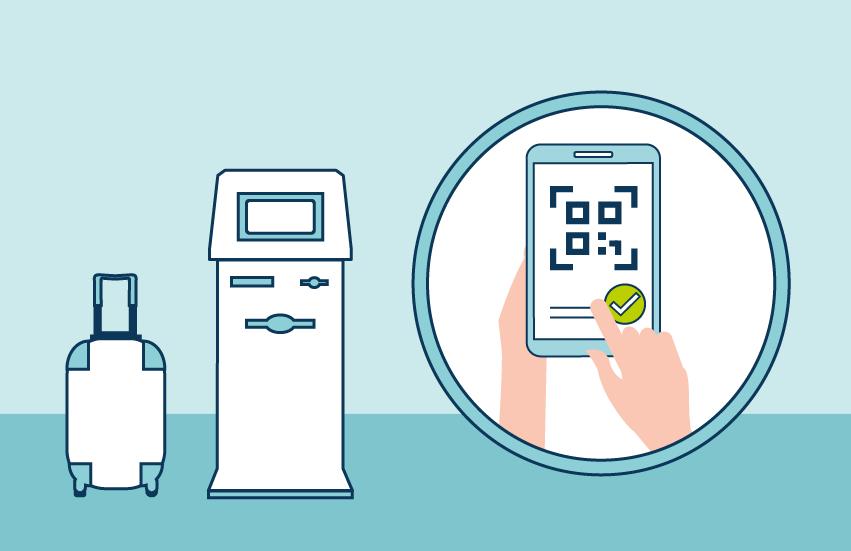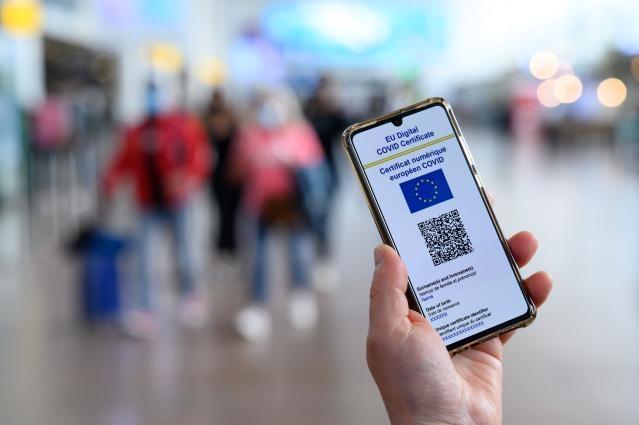Here you can find out what the new EU digital Covid certificate is and how you can travel safely and easily in Europe during pandemic.
What is the EU's digital covid certificate?
All citizens of the EU who
are vaccinated,
have been tested negatively or
are recovered by Covid-19,
can demonstrate this with a digital certificate, the so-called digital covid certificate of the EU.
The certificate is issued free of charge by the national authorities and recognized by all 27 EU member states as well as Switzerland, Iceland, Norway and Liechtenstein.
The certificate is issued in a national language and in English.It consists of a QR code that can either be shown electronically (for example on a smartphone or tablet) or in printed form, and a digital sign that is verified via EU Gateway.
When is the EU's digital Covid certificate available?
The certificate has been stuck since 1.July 2021 and is free of charge.The system has been in use for twelve months since then.
If a country on 1.July cannot issue certificates yet, there is a transition period of six weeks in which other formats that should also be accepted in other EU countries can be used.
How does the EU's digital Covid certificate simultaneously simplify travel within the EU?
With the certificate you can travel within the EU by proving that you have been vaccinated, have a negative test result or have recovered from Covid-19.
The certificate enables a quick check and helps to prevent the use of fake certificates throughout the EU.
The certificate itself is not a travel document.You still need your passport or other form of identification to travel.
The certificate is also not a mandatory prerequisite for traveling, but should make it easier for you to travel.If you have the EU's digital Covid certificate, you should generally be freed from tests or quarantine.
How do I get my EU digital Covid certificate?
There are three ways to get a digital covid certificate from the EU:
Vaccination: They are vaccinated with one of the Covid 19 vaccines
Recovery of a SARS-COV-2 infection: You received a positive test result (PCR) less than 180 days ago
Negative COVID-19 test result: You can show a negative test result (PCR or Council)
Note: The tests recognized according to the certificate includes nucleic acid amplification tests such as RT-PCR tests and antigen-speed tests (Rat).Travelers should always find out about the applicable regulations at the transit and destinations, i.e. which tests are accepted to remove restrictions on freedom of movement.Antibody tests are not recognized, but this can change after the system has been introduced.

EU citizens who have been vaccinated in a third country can apply to the Member State, whose nationality they have or in which their place of residence, can apply for the EU's digital covid certificate.For more information, please contact the Member State, whose nationality you have or in which your place of residence is located.
What data contains the certificate?Are the data safe?
The EU's digital Covid certificate contains only the following information:
Your name
Your date of birth
The exhibition date
Information on the vaccine, for testing or.For recovery
A specific recognition marker
These data remain on the certificate and are not saved when checking the QR code or in the context of other controls carried out by people.
All other health data remain with the national authority that issued the certificate.
What travel measures apply to people with the EU's digital covid certificate?
People who have a valid COVID certificate from the EU should generally not be subject to test or quarantine obligation when traveling within the EU.
The EU countries only have to accept vaccination certificates for vaccines approved in the EU, but can decide to extend this to EU travelers who have received another vaccine.
For more information before your trip, visit the website or app "Re-Open EU" or contact the national authorities of your target country.
In order to support the EU countries in the introduction of coordinated measures to protect public health and at the same time to enable free movement in the EU, the Council has accepted an updated recommendation for traveling within the EU.The recommendation contains, among other things, provisions on common threshold values when examining restrictions on freedom of movement for reasons of public health and a common framework for possible measures for travelers from areas with higher risk.
Covid-19: Travel within the EU (background information)
Plan your trip on "Re-Open EU"
"Re-Open EU" is an app and a website on which all essential information on limits, available transportation, travel restrictions, measures in the area of public health and security, for example the physical distancing or wearing facial masks, as well as other practical informationcan be found for travelers.
All information is available in the EU's 24 official languages.
Visit the website "Re-Open EU"
What do I have to consider if I want to enter outside of the EU?
The Council has accepted a revised recommendation with which the approach for trips from third countries is updated to the EU.With the recommendation of the Council, the current restrictions for not absolutely necessary trips to the EU should be relaxed, with progress in the vaccination campaigns and the development of the global epidemiological situation being taken into account.
If the EU believes that a third country issues certificates according to standards and systems that are interoperable with the EU system, it can take a decision that such certificates from third countries are accepted under the same conditions as digital covid certificates of the EU.
In any case, the rules for the recognition of proof of vaccination would be the same as for EU citizens: vaccines that have been approved across the EU must be accepted, but the EU countries can also decide, also approved by the WHOaccept.
Covid-19: Travel to the EU (background information)



